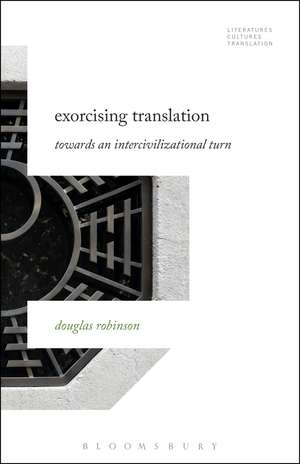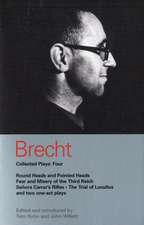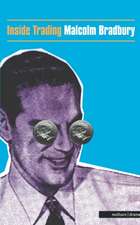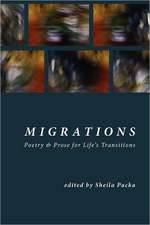Exorcising Translation: Towards an Intercivilizational Turn: Literatures, Cultures, Translation
Autor Professor Douglas Robinsonen Limba Engleză Paperback – 14 dec 2016
| Toate formatele și edițiile | Preț | Express |
|---|---|---|
| Paperback (1) | 190.06 lei 3-5 săpt. | |
| Bloomsbury Publishing – 14 dec 2016 | 190.06 lei 3-5 săpt. | |
| Hardback (1) | 566.35 lei 6-8 săpt. | |
| Bloomsbury Publishing – 14 dec 2016 | 566.35 lei 6-8 săpt. |
Preț: 190.06 lei
Preț vechi: 221.76 lei
-14% Nou
Puncte Express: 285
Preț estimativ în valută:
36.37€ • 37.93$ • 30.23£
36.37€ • 37.93$ • 30.23£
Carte disponibilă
Livrare economică 28 februarie-14 martie
Preluare comenzi: 021 569.72.76
Specificații
ISBN-13: 9781501326042
ISBN-10: 150132604X
Pagini: 208
Dimensiuni: 140 x 216 x 15 mm
Greutate: 0.27 kg
Editura: Bloomsbury Publishing
Colecția Bloomsbury Academic
Seria Literatures, Cultures, Translation
Locul publicării:New York, United States
ISBN-10: 150132604X
Pagini: 208
Dimensiuni: 140 x 216 x 15 mm
Greutate: 0.27 kg
Editura: Bloomsbury Publishing
Colecția Bloomsbury Academic
Seria Literatures, Cultures, Translation
Locul publicării:New York, United States
Caracteristici
This book is more than just a contribution to translation studies: it addresses large-scale civilizational tensions between Eurocentrism and Asiacentrism, Orientialism and Occidentalism, drawing on comparative literature, comparative critical theory, and comparative religion
Notă biografică
Douglas Robinson is Chair Professor of English at Hong Kong Baptist University, Hong Kong, and is one of the world's leading experts on translation. He is the author of path-breaking publications in translation studies, including The Translator's Turn (1991), Translation and Taboo (1996), Translation and the Problem of Sway (2011), and The Dao of Translation (2015). He is also author of important works on postcoloniality, from Translation and Empire (1997) to Displacement and the Somatics of Postcolonial Culture (2013).
Cuprins
Preface0.1 Panicked Eurocentrism0.2 The Structure of the Book0.3 AcknowledgmentsChapter 1: Sakai Naoki on Translation 1.1 Sakai's Model1.2 Implications for Civilizational SpellsChapter 2: The Casting of Civilizational Spells: Nietzsche as Precursor, Bloom as Ephebe2.1 Nietzsche 1: Slave Morality as a Civilizational Spell2.2 Nietzsche 2: The Mnemotechnics of Pain2.3 Bloom 1: The Western Canon as a Tug-of-War Between Civilizational Spells2.4 Bloom 2: The Canon as Memory as Pain2.5 Nietzsche 3: Guilt and Debt2.6 Nietzsche 4: The Desomatization of Somatic Codes2.7 Bloom 3: The Western Canon, Universalized2.8 Cofiguration?Chapter 3: East and West: Towards an Intercivilizational Turn3.1 An East-to-West Countertradition as a Cofigurative Regime of Translation3.2 The Occidentalist Attack on "Immature, Self-Centered Western Minds"3.2.1 Kirkland on Distortions of Daoism3.2.2 Problems in Kirkland's Attack3.3 Three Historical Stages of Laozi Translation3.3.1 Christianity3.3.2 Esotericism3.3.3 Romanticism3.4 First Conclusion: Civilizational Spells, Again3.5 Second Conclusion: Eurocentrism, Decentered3.6 Third Conclusion: An Intercivilizational Turn?ReferencesEndnotesIndex
Recenzii
While the introduction and legitimation of CTS (Critical Translation Studies) to plain old TS (Translation Studies) frames Exorcising Translation, its significance for readers outside of Translation Studies is considerably deeper. In short, out of Sakai's notion of the "civilizational spell," Robinson builds a critical apparatus that can explain Orientalism and its less discursively-defined other Occidentalism, critiquing renowned scholars and philosophers for being spellbound to "ethnocentric misunderstandings of other cultures and other civilizations". . [Robinson] builds a framework for a more ambitious Translation Studies.
Exorcising Translation is a cogent and innovative problematisation of the unnecessarily inevitable and highly influential dichotomy that confronts universalist and relativist ideologies in translation studies, in theory and in comparative cultural studies. Doug Robinson's work exemplifies maturing trends in postcolonial and postmodernist studies.
In his very compelling Exorcising Translation, Douglas Robinson draws heavily from the work of Sakai Naoki, a plethora of figures in translation studies, and several intriguing case studies from Chinese writing, to create a kind of dialogue between "East" and "West." He explores some of the conundrums that have arisen within translation studies and the impasse between the deconstruction of the many cliché oppositions still taken for granted and the labels of "ethnocentrism" and "appropriation" when theorists attempt to cross these oppositions. With the kind of creativity and novelty usually exhibited in Robinson's work, he provides a new kind of vocabulary to examine the borders between binary oppositions from the point of view of the "leakage" across them that, while not eliminating difference, at least help us "demystify" it.
This book presents a very thought-provoking critical exposition of the nature of translation by driving it into its crucial foundations in philosophies in East and West. From this powerful Exorcising, translation emerges beyond temporal and spatial boundaries not just as a bridge between cultures or ideologies but, most fundamentally, between human minds over the troubled water of (mis)understanding under the spell of civilizational biases - an insight meaningful for anyone interested in translation and cultural studies.
Exorcising Translation is a cogent and innovative problematisation of the unnecessarily inevitable and highly influential dichotomy that confronts universalist and relativist ideologies in translation studies, in theory and in comparative cultural studies. Doug Robinson's work exemplifies maturing trends in postcolonial and postmodernist studies.
In his very compelling Exorcising Translation, Douglas Robinson draws heavily from the work of Sakai Naoki, a plethora of figures in translation studies, and several intriguing case studies from Chinese writing, to create a kind of dialogue between "East" and "West." He explores some of the conundrums that have arisen within translation studies and the impasse between the deconstruction of the many cliché oppositions still taken for granted and the labels of "ethnocentrism" and "appropriation" when theorists attempt to cross these oppositions. With the kind of creativity and novelty usually exhibited in Robinson's work, he provides a new kind of vocabulary to examine the borders between binary oppositions from the point of view of the "leakage" across them that, while not eliminating difference, at least help us "demystify" it.
This book presents a very thought-provoking critical exposition of the nature of translation by driving it into its crucial foundations in philosophies in East and West. From this powerful Exorcising, translation emerges beyond temporal and spatial boundaries not just as a bridge between cultures or ideologies but, most fundamentally, between human minds over the troubled water of (mis)understanding under the spell of civilizational biases - an insight meaningful for anyone interested in translation and cultural studies.
























